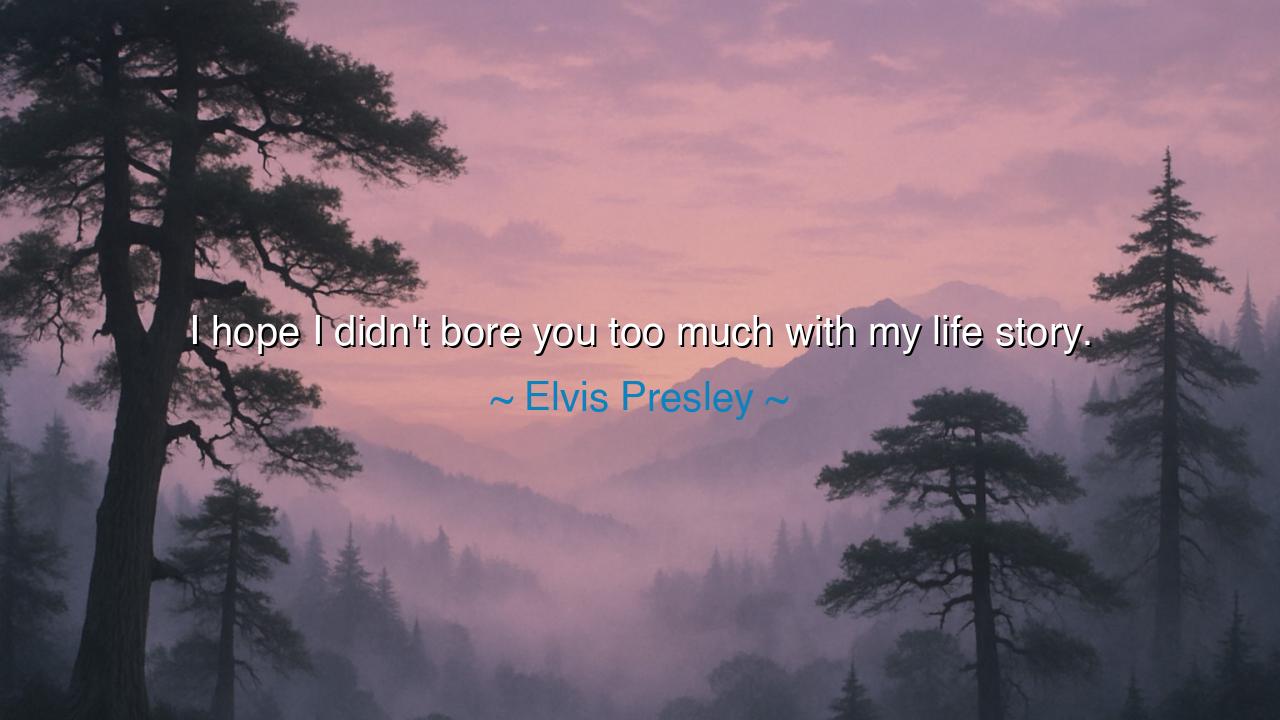
I hope I didn't bore you too much with my life story.






Hearken, O children of the ages, and attend to the words of Elvis Presley, the voice that shook the foundations of music and hearts alike: “I hope I didn't bore you too much with my life story.” In these simple words lies a profound humility, a window into the soul of one whose fame reached the heavens yet whose spirit remained tender, aware, and self-conscious. Even those who ascend to heights unimaginable carry the quiet hope that their tale may still touch, not weary, the hearts of others.
Since the dawn of storytelling, mortals have shared their journeys, their triumphs, and their defeats. Heroes of old—Odysseus wandering the seas, Aeneas fleeing the burning city of Troy—spoke not only of deeds but of the human experience behind them. Presley’s reflection resonates with this ancient tradition: the life story is not merely spectacle or performance, but a mirror for others, a way to offer insight, joy, sorrow, and caution, all wrapped in the intimate vessel of one’s existence.
Consider the story of Frederick Douglass, who recounted his life as a slave with courage and honesty. He hoped that his narrative would enlighten and inspire, not bore, yet he knew that sharing truth demanded humility. So too, Presley’s words reveal an awareness of the delicate balance between revelation and imposition—the knowledge that every listener must choose to walk with him through his life, and that the gift of his story is in the giving, not the boasting.
In humility lies the essence of connection. “I hope I didn't bore you” is more than self-deprecation; it is an acknowledgment of others, an offering of narrative as dialogue rather than monologue. Elvis, though the King of Rock and Roll, understood that a story is meaningful only when it resonates, when it is received with attention, care, and empathy. It is a reminder that greatness is tempered by awareness of the shared human bond, that fame does not excuse neglect of consideration.
History is full of figures whose lives were tales of wonder and struggle, yet who remained aware of the weight of their story upon others. Consider Helen Keller, who chronicled her triumphs over silence and darkness with grace and humility, never assuming that her audience would be obliged to marvel, but trusting that her experiences might illuminate a path for others. Presley’s hope reflects the same awareness: that even extraordinary lives are shared best with humility, respect, and sensitivity.
O seeker, take this teaching to heart: when you recount your own life—your successes, failures, joys, and sorrows—do so with awareness of your listeners. Let your story be an offering, not a demand. Allow empathy, humor, and humility to temper your narrative, for the human heart responds not to grandeur alone, but to sincerity and recognition of the shared human journey.
Moreover, consider the value of stories themselves. Each life, ordinary or extraordinary, holds wisdom, caution, and inspiration. Elvis Presley’s modest words remind us that even the grandest life, when shared with humility, becomes approachable, relatable, and instructive. The lesson is clear: cherish your story, but honor the space and attention of those who listen. Speak to enlighten, to connect, to inspire, not merely to boast or impress.
Thus, let Elvis Presley’s words endure as a guiding light: share your life with humility, mindful of your audience, and recognize that the worth of a story lies not in its fame, but in its capacity to touch hearts. In every narrative offered with care, the teller and the listener walk together, forging understanding, empathy, and connection across the vast tapestry of human experience.
If you wish, I can also craft a short illustrative story showing how humility in sharing a life story inspires connection, making Presley’s wisdom vividly tangible for listeners. Would you like me to do that?






AAdministratorAdministrator
Welcome, honored guests. Please leave a comment, we will respond soon